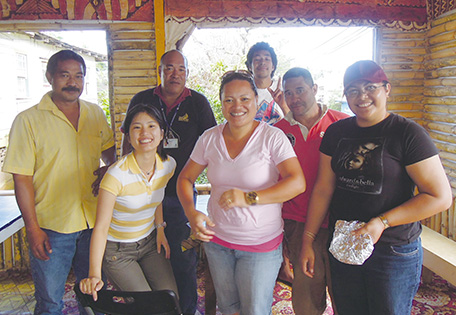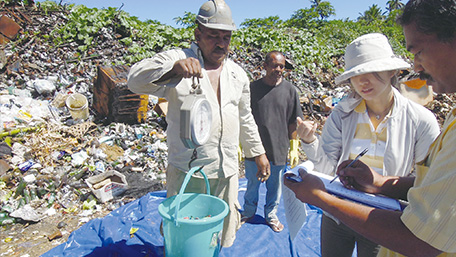Japan's Official Development Assistance White Paper 2013
Stories from the field 18
Saving Beautiful Island from Waste through the Power of Community
– Japanese Working to Resolve Waste Problem on Vava’u Island
in Tonga –

Ms. Kawabata with officials from the Ministry of Environment & Climate Change and Ministry of Health. (Photo: Yurie Kawabata)
The islands of the Pacific Ocean are undergoing a great change as they transition from traditional ways of life in which people subsisted on the bounties of nature to lifestyles dependent on imports from developed countries. This is fueling a rapid increase in the types and amount of waste produced on each island. In many cases, waste is merely buried at landfills, creating ever worsening problems due to the local environment impact of landfills without proper odor or leachate countermeasures.
JICA began support to resolve the waste problem in Pacific island countries in 2000. This led to the start of the “Japanese Technical Cooperation Project for Promotion of Regional Initiative on Solid Waste Management” in 2011. Experts were dispatched to 11 countries across the region. They supported the capacity development of organizations and human resources along with the establishment of systems for appropriate waste management. One of those experts is Ms. Yurie Kawabata, who is in charge of Tonga and Fiji. She has been involved with the waste problem in Pacific island countries since being dispatched to Fiji as a JOCV volunteer in 2004.
The project took place in the remote Vava’u Island, which is renowned as a port for yachts that sees approximately 8,000 tourists from around the world every year. Much of the waste on the island is brought in by tourists.
The project first researched into the amount and types of waste as well as the chain of events leading up to waste disposal. Over 20 tons of waste are generated in the island per day, but only two tons of that is disposed at the landfill. Furthermore, there was no garbage collection service. Although there is some garbage such as kitchen waste used as feed for the pigs and dogs raised in each household, as well as recyclable waste, most of waste is burnt by individual households or disposed of illegally. The project worked to improve the existing landfill and to establish a system for appropriate garbage collection.
For improvement of the existing landfill, specific areas were demarcated for the disposal of waste. Facilities were also set up for the processing of leachate off from buried waste as a water pollution countermeasure. Ms. Kawabata spoke about one of the Ministry of Health officials, who was stationed on the Vava’u Island and played an active role in the landfill improvement activities.
“He was really introverted at first, but after completing three months of training in Japan and returning to Tonga, he led the way on work to improve the landfill. He became so passionate that he even checked in on the situation at the landfill on rainy days and his days off. I am certain that he found his job very rewarding to use what he learned in Japan right away as he looked at the state of improvements with his own eyes. His enthusiasm inspired the other project members, and created a lively atmosphere within the team.”
Mr. Yosuke Ikeda, a JOCV, supported Ms. Kawabata’s activities. Ms. Kawabata is involved in various projects beyond just the one in Tonga, including those in Fiji and Africa. Mr. Ikeda was stationed in Tonga at the beginning of 2011, and was a big help during the times when Ms. Kawabata’s absence. Mr. Ikeda has a degree in electrical engineering, and was working to spread the use of solar power. He used the time he had, before he started his assignment in full swing, to assist with waste survey and conduct environmental education activities at local schools.
Although he had no specialization in waste problems, Mr. Ikeda deepened his interest in the subject little by little. He planned a new project just before the end of his post.
“In the remote islands, batteries used for solar generators were often left to waste away after they ran down. I utilized the network I developed through the waste management project to conduct a campaign for the collection of used batteries. We collected approximately 300 batteries in just over 10 days. I think that this project was only possible because of my involvement in both waste management and solar generation.”
Efforts are underway to develop a system for garbage collection. Ms. Kawabata pointed out the strong bonds of solidarity and organizing ability unique to the communities of Tonga as well as the great spirit of service to local community.
“Each community sets up an independent fund through fundraising activities and so on, and they are carrying out a variety of local service activities. We have applied this preexisting system for garbage collection – which is something Vava’u communities are already trying out – and it has started to show results beyond our expectations.”
In order to reduce the burden of landfill, they also promote the household separation of kitchen garbage, green waste produced from pruning, and recyclable waste, as well as the reduction of each type of waste. The Government of Tonga and local residents have highly appreciated the project, and Ms. Kawabata can feel that the experiences and lessons of Japan have a lot to contribute, and that her activities are making an impact.

Ms. Kawabata instructs a Ministry of Health official on methods of determining waste type and weight. (Photo: Yurie Kawabata)
